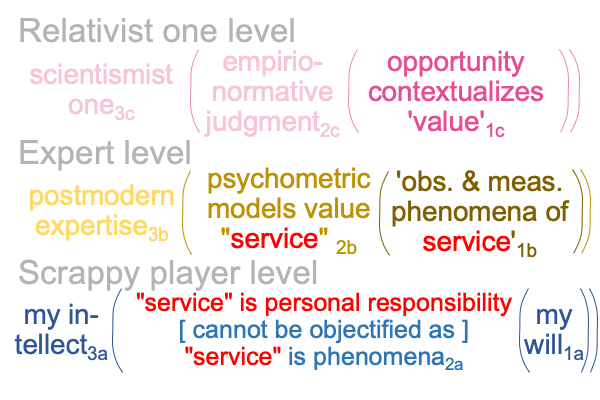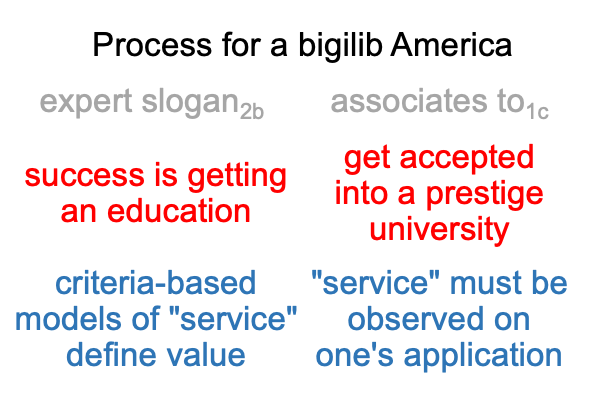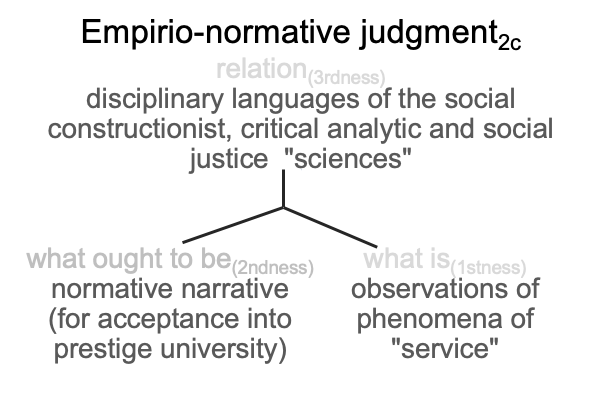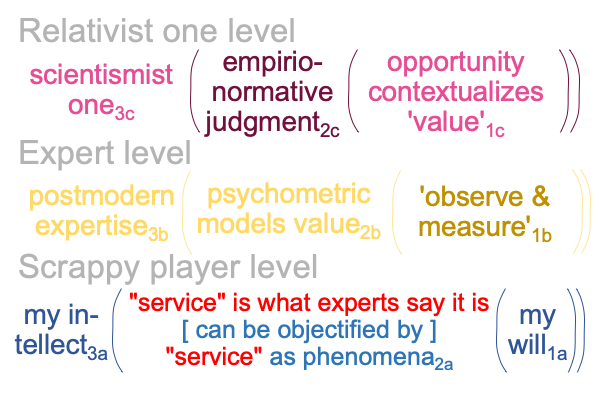0273 Now, that I have examined the introduction and demonstrated how this examination applies the post-truth interscope to Ramaswamy’s text, I go to the end of the book.
The title of the last chapter is “Who are we?”.
Are “we” the ones who have substituted the broadcasts of the empirio-normative judgment for our own thoughts, so what we say can be objectified as phenomena for the psychometric sciences?
Or are “we” the ones who read the previous sentence and ask, “What the hell are we talking about?”
The choice is not so clear.
0274 How so?
Is the American Dream earning a diploma or is it getting ahead?
What do you think?
How can any one person convert another person to his own view when that one person, first, must think up an opinion and second, be willing to say that opinion?
Well, certainly, forums for expressing one’s opinion should be common. Isn’t that the nature of civic society? There are as many venues for saying what one wants to say as there are institutions to belong to. But, how many institutions are there to belong to? And, are those institutions sufficiently different as to allow a broad spectrum of public opinion? Or, is there a balance between public and private? One can say any opinion in private, provided that you have the confidence of family and friends. But, what about in public?
0275 Experts3b are everywhere in public institutions.
Anyone can have an opinion. If one wants to publicly state that opinion, then some expert in synodality may be willing to listen. Your input is phenomena2a to be observed and measured1b and accounted for using a specialized, disciplinary, scientific-sounding language2b. Ultimately, that expert3b will offer a model2b that characterizes value2b according to two, apparently independent formats, the capitalist and the socialist.
It is all very scientific.
Your words are their data.
0276 If you state what you think2a then experts3b will take what you say2a as phenomena2a that may be observed and measured1b in order to build psychometric models2b, that, in turn, will offer an opportunity1c for the one of scientism3c to issue an empirio-normative judgment2c, that is supposed to replace what you think2a.
This is a public service announcement.
0277 Chapter fourteen discusses the bastardization of the term, “service”.
For pluralists, “service2a” is an exercise of individual responsibility2a.
For bigilibs, “service2c” is defined as an activity2c that meets criteria set forth by experts in order, value and righteousness.
Of course, “service2c” is also defined as an activity that for which there is a market, value and price. In short, “service” is potentially billable.
0278 Here is a picture of the post-truth interscope for this topic.

0279 Ramaswamy offers various stories about how “service2a” can be observed and measured1b, then formulated into a value2b that opens the door to an opportunity1c. This opportunity1c may sound like “getting ahead2a“, but is really a chance for the scientismist one3c to churn out an empirio-normative judgment2c.
0280 Say what?
Ramaswamy offers hilarious stories where, what experts3b observe and record1b as “service”2b (according to their models2b) has nothing to do with the exercise of individual responsibility2a.
In fact, it is the opposite.
0281 Consider the post-truth process of passing from situation-level value2b to opportunity1c in regards to an acolyte of the American system who is about to graduate from high-school.
First, psychometric models2b may yield advisory slogans, in regards to success2c.
Second, these slogans2b associate to certain risks1c and opportunities1c.

0282 Clearly, Ramaswamy has some experience in playing this game.
The goal of the young college-bound player is to provide a “service”, that not only meets the expert-established criteria2b, but is clever enough to catch the eye of those who read and evaluate student applications1c. So, entrepreneurship is involved. The student aims to produce a product that satisfies a customer, in the hope that the customer will make an offer.
0283 It is crucial to note that the student is not trying to express his or her own opinions2a. The opinions of others2a have already been sampled and formalized as data1b by educational experts3b using precise terminology. Tables of criteria… er, checkboxes… define “service2b” in ways that have nothing to do with individual responsibility2a. The student attempts to put expert-determined value2b into perspective through the process of applying to a prestigious university1c. A formal acceptance or rejection may be considered to be an exercise of an empirio-normative judgment2c.
0284 Here is a diagram of the empirio-normative judgment2c for this particular topic.

0285 I have to admit that my diagram of the above judgment2c is… well… more than what Ramaswamy discusses. Take a look at that relation! That relation is massively “post-truth”. The three disciplinary languages correspond to normal contexts for an interscope developed in Looking at Gad Saad’s Book (2020) “The Parasitic Mind” appearing in Razie Mah’s blog between April 11 and 29, 2023. The rest of the judgment corresponds to what Ramaswamy discusses.
0286 Success2c for the scientismist one3c is an actionable judgment2c arising from an opportunity1c to put the expert levelinto perspective.
Success2a for the scrappy player is “getting ahead”2a.
The question must be asked, “Is success2c for the one of scientism3c the same as what the scrappy player thinks ‘success2a‘ is?”
0287 For this example, a student contrives to conduct “service” in such a way that it neglects personal responsibility2a in favor of sales potential2c. Service2c gets integrated into what I think2a, as shown in the following figure.

0288 May I ask the question, once again?
Is “service” an act of individual responsibility?
Or is “service” what the experts say it is?
